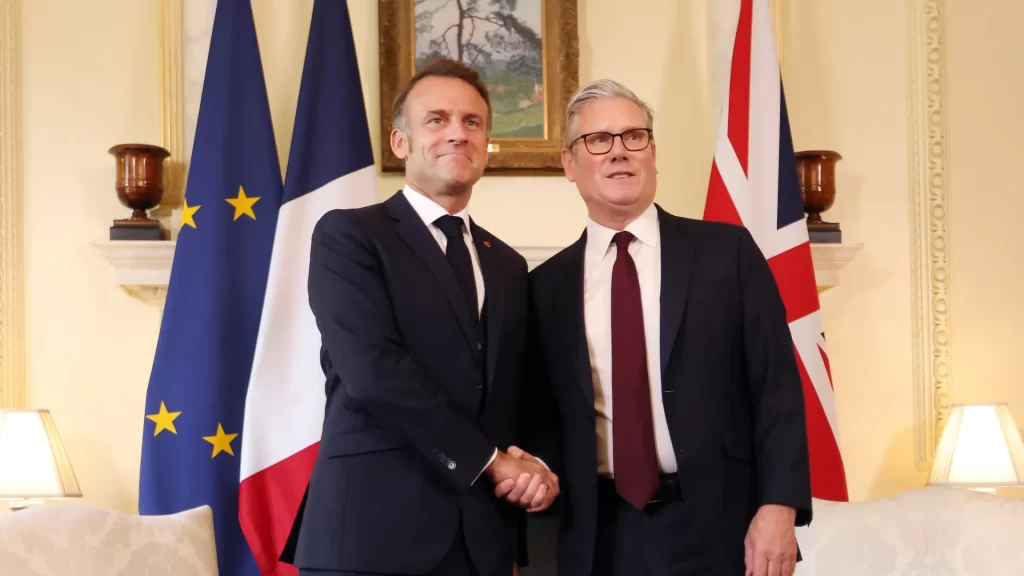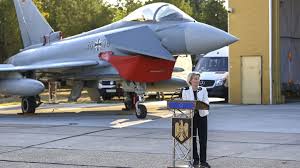Macron, Starmer agree ‘new deterrent’ needed against illegal migrants, says UK

London: French President Emmanuel Macron and British Prime Minister Keir Starmer agreed on the need for new solutions to the problem of illegal migration on Wednesday, Starmer’s office said, laying the groundwork for a bilateral summit on Thursday.
Macron and Starmer met for lunch during what is the first state visit by a European leader since Brexit, with both sides talking up the need to deliver concrete progress to stop migrants travelling to England from France.
“The leaders agreed tackling the threat of irregular migration and small boat crossings is a shared priority that requires shared solutions,” a summary of the meeting sent out by Starmer’s office said.
“The two leaders agreed on the need to go further and make progress on new and innovative solutions, including a new deterrent to break the business model of these gangs.”
London has been pushing for a “one in, one out” deal to send small boat migrants back to the continent, in exchange for the UK accepting asylum seekers in Europe who have British links or families in the UK.
Starmer is seeking to agree to a returns deal for asylum seekers ahead of Thursday’s summit.
Such an agreement would help the British leader meet a pledge to stop the flow of tens of thousands of people into Britain from across the Channel.
France has rejected a returns deal for asylum seekers in the past, saying Britain should negotiate with the EU as a whole.
Under Starmer’s plan, Britain would deport one asylum seeker to France in exchange for another with a legitimate case.
But in a speech on Tuesday, Macron spoke of the need to address “migration pull factors”, suggesting any deal would require Starmer to make it harder for migrants who do not have legal status to live and work in Britain.
After he took power a year ago, Starmer promised to “smash the gangs” getting thousands of migrants onto the small boats, only to see numbers rise to record levels.
More than 21,000 migrants have crossed from northern France to southeast England in rudimentary vessels this year as the far right soars in popularity.
Discussions between Macron and Starmer on Wednesday are also expected to focus on aid to war-torn Ukraine and bolstering defence spending.
The two countries have been working to create a military force to back Ukraine in the event of a ceasefire between Kyiv and Moscow, and cooperation on trade and defence were themes in Macron’s speech on Tuesday.
France’s Engie said on Wednesday it would invest €1.2 billion ($1.41 billion) in energy storage in Britain, following a 1.1 billion-pound deal from France’s EDF in a nuclear power project in eastern England.
The talks at Downing Street came after a first day dominated by pomp and a warm welcome from King Charles III and members of the royal family.
Tuesday’s royal welcome from King Charles III and his wife Queen Camilla included a horse-drawn carriage procession, a 41-gun salute and a sumptuous banquet at Windsor Castle, west of London, for the president and his wife Brigitte.
The Macrons began the second day of their visit by paying their respects at the tomb of the late Queen Elizabeth II at Windsor’s St George’s Chapel.
Macron then discussed biodiversity issues with the king during a stroll in the castle grounds before he bade farewell to his host and headed to central London.
This is the first state visit by a French president to Britain since Nicolas Sarkozy in 2008 and the first by an EU head of state since Brexit.
After Britain’s acrimonious departure from the EU, the two countries smoothed post-Brexit tensions in 2023 during a state visit by the famously Francophile king and a summit with Prime Minister Rishi Sunak in France.
At the state banquet in Macron’s honour, Charles toasted a new UK-France “entente… no longer just cordiale, but now amicale”, prompting Macron to laud “this entente amicale that unites our two fraternal peoples in an unwavering alliance”.
On Wednesday morning, Macron also met entrepreneurs and scientists working on artificial intelligence at Imperial College London.





